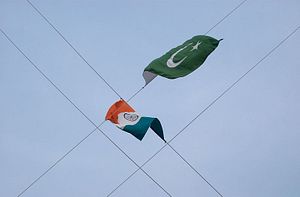Last week, Pakistani Prime Minister Imran Khan in a Twitter message congratulated Indian Prime Minister Narendra Modi on his remarkable electoral victory in the 2019 Lok Sabha elections. “I congratulate Prime Minister Modi on the electoral victory of BJP and allies. Look forward to working with him for peace, progress, and prosperity in South Asia,” the Pakistani PM tweeted. Responding to Khan’s tweet, the Indian Indian Prime Minister said that he had “always given primacy to peace and development in our region.”
So, where does Pakistan and India’s relationship go from here? Apparently, tensions between the nuclear-armed neighbors have started to subside with India entering the post-election phase.
Last week, Pakistan’s Foreign Minister and India’s External Affairs Minister met on the sidelines of the Shanghai Cooperation Organization (SCO) summit. Their interaction was significant: the fact that India and Pakistan’s delegation met at the summit shows that both states are interested in focusing on rapprochement again after an active conflict phase earlier this year. It’s possible that Sushma Swaraj and Shah Mahmood Qureshi wouldn’t have met had the summit been planned during the midst of India’s election.
The good news is neither India nor Pakistan is in the favor of carrying forward the hostility that ensued after the Pulwama incident in February. Reportedly, the government in Pakistan is planning to appoint a National Security Advisor (NSA) to establish a back-channel with India’s newly elected government. Pakistan and India have a rich history of back-channel efforts achieving outcomes that would hardly be possible otherwise. In Pakistan and India’s case, the more bilateral interaction stays away from the media’s glare the better. At times, the coverage and spin given to talks in local media can become an impeding element itself.
After a severe conflict phase, back-channel efforts can repair more confidence than public statements given from both sides, aimed at gauging the other actor’s response. Arguably, it’s always better to have informal yet structured contacts in place to agree on the agenda of potential talks or on what both countries expect going forward.
Another reason that Pakistan and India should use their NSAs for talks is because of the mandate such appointments carry. In Pakistan as well as in India, the appointment of an NSA is made at the highest of policy-making levels. This effectively means that a back-channel contact can not only establish a direct line of contact between the two countries leaderships, but can also prove fruitful in constraining trust deficits.
Moreover, after severing ties to a level where war seems like a real possibility, governments in both states cannot approach each other without expecting major resistance domestically. Under current circumstances, this is more relevant in India’s case than Pakistan’s. NSA-level dialogue that takes place behind closed doors can be used by Islamabad and New Delhi to formulate responses and come to an understanding when it comes to the intent of policymakers in both countries.
It’s expected that Pakistan will appoint an NSA soon. Usually, NSAs in Pakistan come from a military background and they not only have the trust of the country’s national security establishment, but also of the elected governments. A previous such appointee was Lt. Gen. (retd) Naseer Khan Janjua. In 2015, Pakistan’s Janjua and his Indian counterpart, Ajit Doval, were influential in breaking the ice. Reportedly, the two held meetings privately before a composite dialogue began between India and Pakistan.
In 2007, Pakistan and India’s foreign ministers, after a long phase of back-channel negotiations, were able to put together some very creative ideas concerning the issue of Kashmir. In another case, after the 2001-02 India-Pakistan crisis, ground for peaceful diplomacy became possible after an intense back-channel diplomacy, in which secret talks were held in 2003 between India’s NSA Brajesh Mishra and Tariq Aziz, a senior advisor to President Pervez Musharraf.
Given that the elections are over in India, it’s possible that any offer of rapprochement either from India or Pakistan will be taken seriously by the other side. It’s expected that both countries will create more opportunities to make sure that dialogue between them begins at some level.
However, if the cooperation between India and Pakistan is to survive, both states need to neutralize the effects of potential spoilers. The appointment of NSAs and the revival of back-channel diplomacy is one way to achieve that.

































